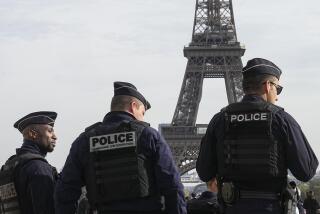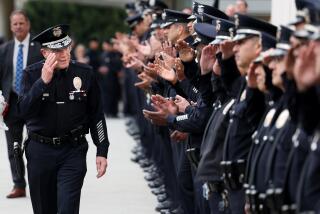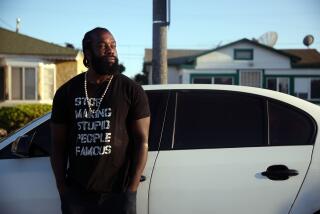King Verdict Show of Force to Be Massive
LOS ANGELES — Los Angeles Police Chief Willie L. Williams’ ambitious plan to flood city streets with uniformed officers before verdicts are announced in the Rodney G. King civil rights trial would be the largest emergency show of force in the city’s history.
Normal police operations, such as vice and narcotics squads and the DARE program, will be shut down to free officers for riot detail, and some sick and injured officers will be called in to duty.
In Orange County, several local police departments said Wednesday that they plan to be on the alert when the verdict is read.
“If we get a feeling that there is going to be a negative reaction, then we’ll put more people out in the field, Garden Grove Police Sgt. Dale Farley said..
Santa Ana Police Sgt. Dick Faust also said his city is prepared for any unrest but added, “We’re expecting everything to be peaceful in Orange County.”
Some departments have also indicated that they will assist Los Angeles if called.
Costa Mesa Senior Police Officer Wayne Riedman said the department is “fully prepared to go to Los Angeles as need be.”
On Wednesday, sources provided new details of the chief’s plan, which will get under way as soon as jury deliberations begin--perhaps as early as Friday. Although Williams promised to put the full strength of the department on the streets at that point, sources said Wednesday that total mobilization will come as part of a three-step process:
As soon as the jury retires for its deliberations, many normal police functions will be suspended as desk duty officers prepare for action. When the judge announces that the verdicts are ready, up to 6,500 officers will go on 12-hour shift rotations and begin patrolling all areas of the city. The third phase will come if police and city leaders call for assistance from other Southland law enforcement agencies, including the National Guard.
With full police mobilization, officers will form special units of up to 15 officers that have been trained to handle “unusual occurrences,” sources said. These units will be backed up by six 50-officer teams that will be sent into the areas most affected last year, including South-Central, Koreatown, Pico-Union and Hollywood.
Despite Williams’ optimism about his plan, even supporters acknowledge that it may be difficult for the department to closely patrol every neighborhood of the city with a large, uniformed police presence. The LAPD, with 7,690 officers, is one of the nation’s smallest big-city police departments.
It also will cost a lot of money. With full mobilization, the city’s cost for police services could reach $1.5 million a day, city officials said. And if full-blown riots break out, as in the civil unrest last year, the costs could become enormous.
But officials say that expense is no object, even with the city facing a deficit of up to $550 million.
City Hall support for the department is running high, unlike last year, when a slow and fractured police response was blamed in part on polarization of the LAPD and the city’s leadership. Demonstrating the new level of partnership, Mayor Tom Bradley met with Williams on Wednesday, telling the chief that federal authorities have said they will approve $1.7 million in aid to help pay for the costs of dealing with another riot.
Even City Councilman Zev Yaroslavsky, formerly a harsh critic of the LAPD, was flush with praise for Williams and his readiness to aggressively react at the time of the verdicts.
“I am very impressed,” he said. “I have to tell you, if something goes wrong, it won’t be for lack of planning and preparation on the part of the police.”
Officials scoffed at questions about whether other crime-fighting functions could suffer during a massive mobilization. “The increased number of officers on duty will be so enormous that all communities will be protected,” Councilman Marvin Braude said.
Williams’ proposal, however ambitious, is not without its detractors, including some within his department.
One longtime police captain, speaking anonymously, said the chief should call in the California National Guard the moment the jury begins deliberations. He recalled the logistics problems that delayed the Guard’s arrival in Los Angeles last year.
“I don’t think the LAPD is enough,” the captain said. “I think they should have the National Guard here immediately, before the verdict. Because if they’re not here within an hour, there could be enough damage to the city of Los Angeles that the people here will never forgive us.”
Equally skeptical was a police union director, who spoke anonymously because the Police Protective League has yet to officially issue an opinion on the LAPD deployment plan. He noted that police morale continues to sag miserably, with many officers still angry that overtime checks were delayed after last year’s riots.
“They’re asking us to do more with less here,” he said. “They’re trying to cancel days off without giving reasons.
“And it took them so long to pay the overtime last time that officers are still calling and complaining. Some are saying that if the same happens again this time, they want their money up front.”
Lt. John Dunkin, a Police Department spokesman, said Williams and other top LAPD officials will not address details of the deployment plan or respond to criticism.
“Clearly, we can’t make this public,” he said. “It would impact on the effectiveness of the plan. And we’re not going to discuss specifics.”
However, Williams was specific in his pledge Tuesday to meet any rioters with police muscle if things get out of hand as they did last April 29, when police officers accused in the King beating were acquitted in state court of all but one count.
‘We want to let the community see that gradual building up of uniformed officers on the street,” Williams said. “And then, as soon as we find out the verdict is going to be imminently announced, whether it’s a few hours or overnight or whatever, we will go to a full mobilization. That mobilization will mean uniformed officers on the streets all across this city.
“We will not be sitting in command posts waiting for something to happen.”
DEFENSE MOVE DENIED: Argument by Sgt. Stacey Koon’s lawyer is rejected. A26
More to Read
Sign up for Essential California
The most important California stories and recommendations in your inbox every morning.
You may occasionally receive promotional content from the Los Angeles Times.











